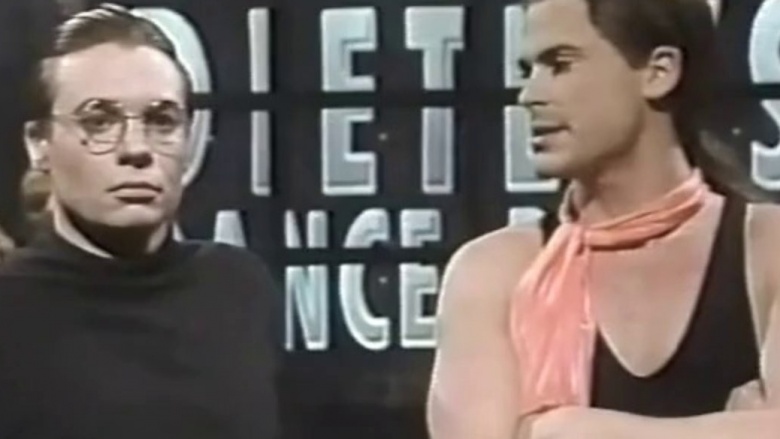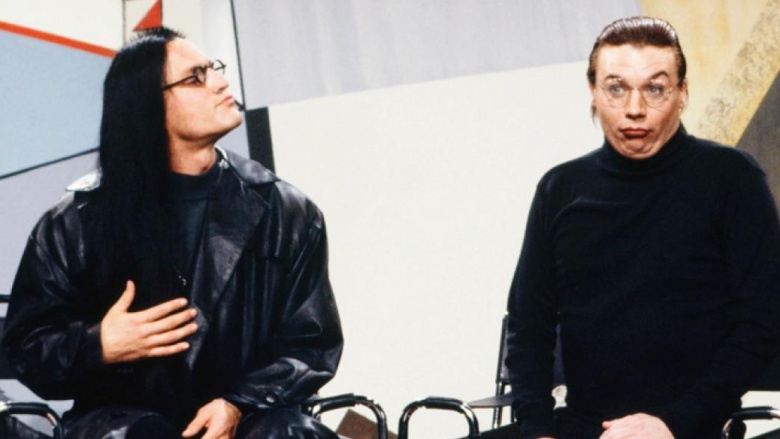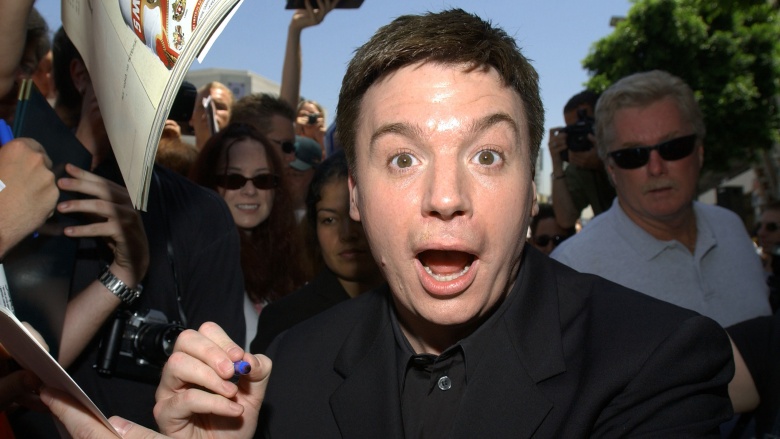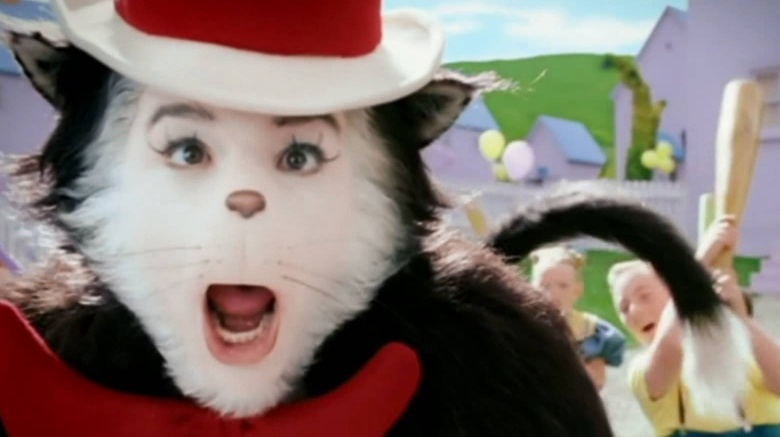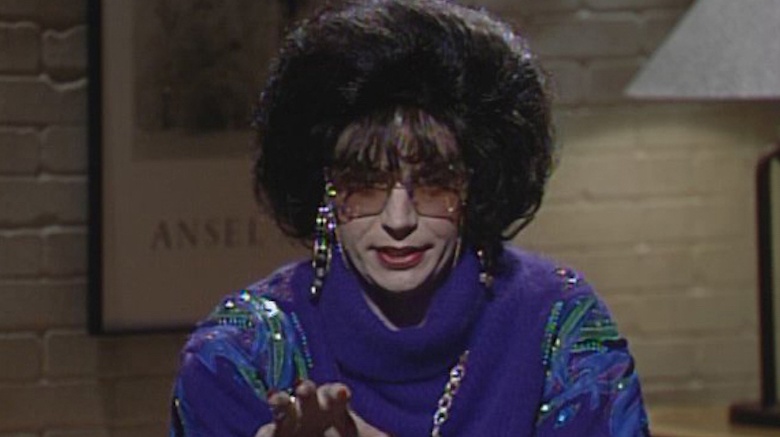The Real Reason Mike Myers' Dieter Never Happened
After Mike Myers' phenomenal big-screen success with Wayne's World and Austin Powers: International Man of Mystery, production started in 1998 on Dieter, the next surefire hit from the ex-Saturday Night Live star, screenwriter, and comic chameleon. Myers' second-best-known SNL bit after "Wayne's World" was probably "Sprockets," a bizarre German talk show hosted by the off-putting, nihilistic, art-schooly, all-black-wearing, stereotypically German guy Dieter, along with his pet monkey Klaus. (Like Wayne Campbell, Dieter was a catchphrase machine: standouts include "I'm as happy as a little girl," "Now is the time on Sprockets when we dance!" and "Would you like to touch my monkey?")
With a cast that also included Will Ferrell and Jack Black, Dieter should've been released in the summer of 2001...but it was never even filmed. What happened?
Dieter was not a likable character
Myers penned the script with his Austin Powers co-writer Michael McCullers and longtime SNL writer Jack Handey (best known for his absurd "Deep Thoughts" segments). The screenplay both expanded the world of Dieter and gave it a simple, easy-to-follow plot: Klaus the monkey is kidnapped for ransom, and the ratings for Sprockets plummet. Dieter learns that Klaus has been taken to the U.S., but he can't afford the ransom because he's spent all of his money on "arts and lotions." So he heads to America to find Klaus himself, along with his goofy American cousin Bob Sheeder (played by Will Ferrell) and professional monkey tracker Daryl Hanes (Jack Black).
Virtually any amusing character can sustain a comedy sketch—or as is the case with Dieter, a series of them. But a character generally needs to have certain traits to anchor the comparatively long haul of a 90-minute movie. For example, the audience has to like them, or root for them, or identity with them in some way. Myers had no interest in doing this with Dieter, and his lead character was exceedingly cruel, which is a tricky business in what was supposed to be a broad, big-budget studio comedy. For example, in one scene, Dieter lies to the FBI and tells them that Klaus is his human son. A raid goes bad, and a bunch of FBI agents are killed in the process. An FBI agent dresses down an unemotional Dieter, telling him "we lost six men out here tonight, mister! Six good men with families! My partner for 20 years just died with his large intestines in his hands! He was crying for his momma while blood came out of his ears and for what? A chimp?" Dieter's reply: "A spider monkey, actually. Chimps are much larger."
It would have been a hard sell for American audiences
That off-putting personality, however, was a important part of Dieter: He's an over-the-top stereotype of a Communist-era German. As such, the script was full of references to relatively obscure German pop culture, such as early 20th century art movements, the films of 1930s director Fritz Lang, numerous Nietzsche quotes, and a spot for a cameo by German filmmaker Wim Wenders. (Myers also wanted a cameo from David Hasselhoff, because, as Norm Macdonald so frequently noted on SNL's "Weekend Update," "Germans love David Hasselhoff.") All of that would be quite funny to an audience if they had some frame of reference for the material. Austin Powers worked because the cliches of '60s spy movies were familiar to American audiences. The mainstream American viewing public, by and large, has little knowledge of German art.
Myers hated his own script so much that he quit the movie
While there were definitely problems with the script, nobody was more aware of that than Myers. He and his collaborators reportedly went through 14 drafts over the course of two years, still failing to come up with one that Myers thought was good enough. With only weeks before filming was to start in 2000, Myers was so dissatisfied with the script that he decided he couldn't make the movie and backed out of the project. Since he was the co-writer, creator of the character, and star, that essentially meant the movie was canceled, and Myers ultimately returned the portion he'd been paid of the $20 million he'd been set to earn.
Universal Pictures sued Myers…
Movie studios generally don't like it when the talent pulls out of a movie they've already invested tens of millions into in preproduction costs like sets, costumes, and salaries for crew and cast. Universal alleged that after Myers quit, it had to lay off 25 people that had been hired to work on the production, and about a week after Myers left Dieter, the studio sued him for $5 million. In the lawsuit, the studio claimed to have ceded to multiple Myers demands throughout the movie's ill-fated history, such as doubling his salary from $10 million to $20 million (after the $200 million box office success of Austin Powers: The Spy Who Shagged Me made him a much more valuable commodity). The lawsuit even aimed to freeze him out of Hollywood by barring him from working on any other movie during the time in which Dieter would have been filming. Myers, Universal, and their various attorneys immediately started working on a deal before the case saw a judge. Even Steven Spielberg tried to get the parties to come to an agreement.
…And then Imagine Entertainment sued Myers
About a month after Universal sued Myers, Imagine Entertainment sued him for $30 million for breaching a separate contract it had with the writer and star. To support the claim, lawyers argued that Myers had a reputation for his kind of behavior, saying "he has followed a pattern and practice of breaking his promises."
…And then Myers sued Universal
So after walking away from $20 million because he didn't like his own script, and then being sued for a grand total of $35 million, Myers then countersued Universal Pictures for damages of more than $20 million, citing fraud and an invasion of privacy on Universal's part. (Myers said that the man the studio hired to serve him with the lawsuit papers "stalked him" and followed him "in a threatening manner down dark, winding, and unlit streets.") In a statement to the media, Myers said he was proud to have left Dieter because he could not "in good conscience accept $20 million and cheat moviegoers who pay their hard-earned money to see my work by making a movie with an unacceptable script."
Myers made The Cat in the Hat instead
What does Myers starring in an adaptation and expansion of the classic Dr. Seuss book have to do with a comedy about a German talk show host? Representatives from DreamWorks (which also had a financial stake in Dieter) ultimately helped negotiate an out-of-court settlement between Myers, Universal, and Imagine. All parties dropped all of their various lawsuits against each other, with one of the contingencies being Myers agreeing to star in a Universal/Imagine/DreamWorks co-production. That movie: the live-action version of The Cat in the Hat, released in late 2003. It was such a truce of a movie that even the director of the canceled Dieter movie, Bo Welch, was hired to helm this one.
Myers was accused of stealing the Dieter character
In the late '80s, Myers honed his sketch comedy chops at Second City, the famed Chicago improv and comedy theater. One of his fellow troupe members was a Canadian comedian named Dana Anderson. At the theater, Anderson claims he developed a character for a sketch: a weird German guy prone to yelling out phrases like "touch my monkey!" Soon thereafter, Myers got hired for SNL and debuted Dieter, a weird German talk show host who asked guests, "would you like to touch my monkey?" Although nothing ultimately came of the accusations—Anderson himself shrugged that Myers "could have invited us to the set to see Saturday Night Live before he left"—it didn't do anything at all to help Myers' growing image as a prima donna who had an unfortunate tendency to borrow ideas without asking.
Saturday Night Live movies were not doing well anyway
The $121 million box office take of Wayne's World in 1992 led to a bunch of movies in the '90s that were adapted from popular SNL sketches. Among them: Coneheads, Wayne's World 2, It's Pat, Stuart Saves His Family (based on Al Franken's self-help addicted Stuart Smalley), A Night at the Roxbury (from the sketch where Will Ferrell and Chris Kattan play sleazy club guys), and The Ladies Man. The only bona fide box office hit on the list? The original Wayne's World. Filmgoers clearly weren't interested in going to see just any movie based on a character they may have liked for five minutes at a time on TV, and this anti-SNL climate certainly didn't do any favors for getting a Dieter movie off the ground. In fact, Myers signed on to make Dieter very shortly after another movie project fell apart: Coffee Talk, built around on his SNL character Linda Richman. SNL wouldn't send another movie to theaters until 2010's MacGruber (which also bombed).

